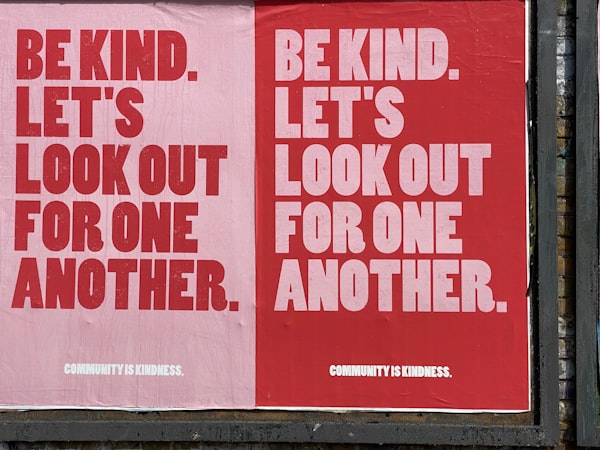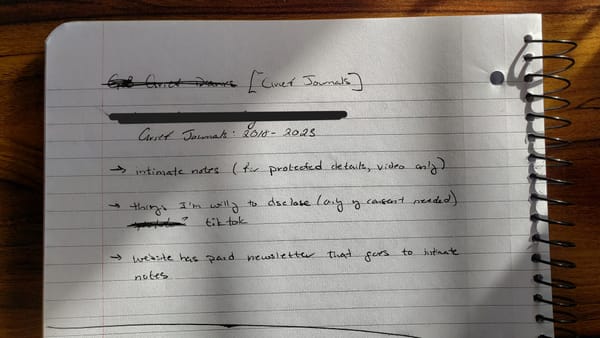"I have all the responsibility, and none of the power"
How conflict shows up and impacts BIPOC leaders at work.
I didn't feel like I was an aggressive person until I got into the workforce and was labeled that.
In November 2023, I interviewed seven people of color working in "socially conscious" organizations. These interviews were meant to validate my hypothesis that people of color working in social change organizations want to learn conflict resolution and communication skills.
I share these notes in case it helps you feel seen in your experience or that it encourages managers/supervisors to show up for their BIPOC staff.
Ways conflict/tension can show up at work
- Colleagues not following through on their commitments or trying to pass their responsibilities off to other people
- Creative ideas being enthusiastically promoted by leadership but not giving people the resources they need to execute
- Managers and supervisors assigning a lot of work with tight deadlines and being unclear about expectations
- Differences between the value people get out of work. For some people, work is where they go for social engagement, and for others, it is simply a paycheck
- Some organizations have a long history of being resistant to change and when change is needed, conflict arises
- Some folks have "radical" beliefs and personal values that are at odds with the organization's processes - like being anti-police while your job requires police intervention
- Within organizations where the majority of staff share an identity, the "different" person becomes the spokesperson for all people who share their identity
- Board members or other organization leaders having priorities that are out of alignment with what the team can actually deliver.
Things I found interesting + common themes
- People's ability to navigate conflict is influenced by the industry they're in and the structure of those organizations. Someone working in higher ed would need different resources than someone working in a social change non-profit.
- While most of the participants didn't have training or education around managing conflict, they found ways to get the support they needed - which mostly looked like meeting with colleagues to vent.
- The majority of participants talked about work conflicts with white people and named whiteness/white supremacy as their primary obstacle.
- People are afraid that if they don't handle the conflict in the way people in power (white folks) deem appropriate they'll be fired.
- BIPOC folks early in their career are trying to adjust to "professionalism" and white supremacy culture at work.
- Mid-career BIPOC folks have identified the people they need for support, but they lack resources on how to proactively help early-career folks and aren't clear about how to navigate conflict as a manager.
- Organizations that struggle with internal conflict disempower staff and BIPOC folks start to feel like they aren't welcomed or belong there, leading to burnout.
- Folks were mostly looking for validation about their experiences when addressing the conflicts they found themselves in. Without validation, they doubt themselves and feel unsupported.
- Many organizations have values related to helping people and being a supportive resource for their community, but they don't model those values internally.
Solutions for navigating organizational conflict
These are all solutions participants came up with.
- Know how to find and build relationships with people who have influence and who can advocate for you
- White people need training on white supremacy and their impact on POC staff
- POC folks could benefit from training on how to navigate culturally white organizations and professionalism
- Accept that some conflicts can't be resolved and know what to do with that
- Learn how to advocate for yourself while protecting your job
- Learn how other people are finding tools and surviving in these places
- People in leadership positions need to unlearn the fear they have around conflict
- Invite a third-party person into the space to facilitate dialog and hold conflict-resolution processes
Things people said that stayed with me
Lightly edited for privacy and clarity.
My organization arranges all these DEI trainings and problem-solving solutions, but I wish they would stop and listen to us because I feel like we expressing what we need with clarity. They just choose to skip right over that.
When I think about conflict resolution, I think about being triggered and what it means to respond to triggers adequately in the workplace. I don't think we realize that there are people actively doing some really harmful stuff in these environments and activating people's trauma.
Conflict is hard, especially in the workplace because this is your living. This is how you're making money. You want things to go as smoothly as possible so you can get your check and go home. But any trouble there feels bigger than what the actual conflict is because there's so much at stake.
It costs organizations money to hire someone, probably another person of color, to do DEI training because you created a hostile space for someone to not want to exist in. And then it's another person of color that has to come in and clean up your shit, and they're probably burnt out too. Then there's this cycle of people coming in and out, and that costs you. You have to pay out my PTO and insurance, and none of those things are funded by your grants. Like I hate to say that the way we get organizations invested is by telling them that it's going to cost them more money because they don't have a safe culture for people to exist in. Which is really disgusting, actually.
As the executive director of my organization, I answer to my board and manage a small team. I have all the responsibility, but none of the power.
Going forward
This program is a response to my own experiences with conflict in professional and volunteer organizations, and how I wished I knew how to address conflict in a way that preserved the relationship. It is also influenced by my course Cultivating a Loving Practice, where participants (and myself) often have to overcome our fear of conflict/tension/rejection to get our needs met in relationships.
The program was going to be heavily focused on peer education around transformative justice and generative conflict, but as a result of these interviews, I see that as less of a need.
While I intend to hold space for conflict education, I am going to adjust the program to focus more on giving people a space to talk about their experiences and give/receive advice from people in similar situations.
My personal goal is to help people learn how to navigate conflict in a way that preserves and strengthens relationships, but sometimes that isn't possible. In that case, people need support for "self-preservation," as one participant named.
These interviews were specifically about workplace conflict because I'd like the program to be something employers will pay for. However, community members can want support in navigating conflict in any type of group.
Similar interviews were held in preparation for Cultivating a Loving Practice, you can find those notes here if you're interested. Those interviews explore why queer and trans people of color may or may not struggle with creating satisfying relationships.





